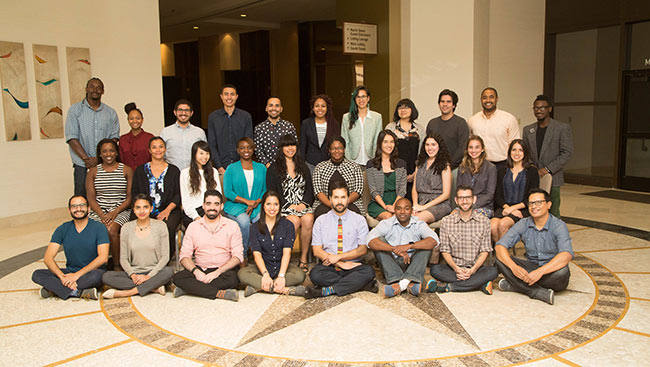
Sometimes, we forget that science is not just an individual quest. It is much more. It involves a whole community of people.
That’s why volunteering, which can include mentoring, serving on committees in organizations and in professional societies, and conducting advocacy and outreach, for example, has been such an important part of my life.
I get involved because I feel that one needs to give back to the scientific community. One also needs to help those in the scientific community that face special challenges, such as the challenges women and underrepresented minorities face.
I am reminded of something that President Obama said, in a different context: “No one has a monopoly on intelligence.”
We don't know where the next big breakthrough in neuroscience will come from. So, we cannot afford to lose talent when so many underrepresented minorities and women drop off after grad school.
No matter who we are — whether a graduate student, postdoc, or a faculty member — we can all do our part to give back to the community in different ways to halt this loss.
For example, if you are a graduate student or postdoc, you could mentor undergraduates or elementary, middle, and high school students, including those in disadvantaged areas of your city.
If you are a faculty member, you can give special attention when mentoring undergraduate and graduate students and postdocs from underrepresented minorities groups and women.
I feel passionately about this and have contributed to supporting such individuals. I consciously set aside time, so it’s not just something that happens or gets overshadowed by my lab work.
Currently, I volunteer on SfN’s Professional Development Committee (PDC) and on PDC’s Diversity in Neuroscience Subcommittee (DINS). I'm amazed at what DINS does in terms of mentoring underrepresented minority students and postdocs through the Neuroscience Scholars Program (NSP). I also serve as a DINS Touchstone (mentor) for the NSP.
Every summer when I review NSP applications, I'm blown away by how much talent there is. Their academic CVs, including the science they are doing and their publications, are stellar. I’m amazed at how much perseverance they show. Many have overcome big challenges, perhaps that others don't face, in terms of overt and implicit biases, and family situations.
It's important for us to be conscious of that — and to help — because so much talent can be easily lost.
SfN runs incredible advocacy activities in the United States, and scientists in the US have the opportunity to participate in these efforts.
If you live outside of the United States, you can get involved in neuroscience societies in your country. You can check with IBRO or your national society to see what may be available, and how you can help. If there isn't anything happening where you live and work, then start something. We need the public and politicians to be aware of what science has to offer, and the need to support science.
I served on the board of the Canadian Association of Neuroscience (CAN) for 10 years, with two of those years as CAN president.
When I began my tenure at CAN, we had just started to hold annual scientific meetings. I saw firsthand the importance of bringing together Canadian neuroscientists from coast to coast to foster interactions and collaborations across the country. I saw how critical it was to build a sense of community and to develop a voice for public advocacy to promote research funding in Canada.
Our needs in Canada vary from those in the United States because we have a different system of government, and they have to be addressed in a uniquely Canadian way. If you are in Europe, you have your own ways of handling your needs.
It is important to have strong neuroscience groups, associations, or societies in different countries because when neuroscience is strong in other countries, SfN becomes stronger as well.
We all like to get together at SfN’s annual meeting to exchange ideas, present our work, and interact with our colleagues from around the world, but for that to happen successfully, all our countries need thriving neuroscience communities.
One can also volunteer one’s time to supporting Charities and Foundations that support medical research.
I'm on the Medical Advisory Committee of the Multiple Sclerosis Society of Canada and on the Scientific Advisory Board of the Wings for Life - Spinal Cord Research Foundation headquartered in Austria. These organizations raise funds for research to solve important neurological problems to improve the lives of people afflicted.
In closing, I urge everyone to find their own ways to volunteer, whether it's locally at your university or in your city, nationally, or also internationally. There are unique challenges facing different countries, and that's why we all need to take action, no matter where we live.
By volunteering in some of the ways I’ve described — whether that’s through professional societies, mentoring, or advocacy and outreach activities — we can support not just the scientific community, but also make a difference to people who suffer from neurological disorders and their families.
The SfN Call for Nominations is now open through February 11, 2022. Serving on an SfN committee can help scientists at all career levels gain leadership experience and network with influential members of the neuroscience community. Nominate yourself or a fellow colleague today.






